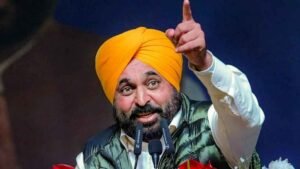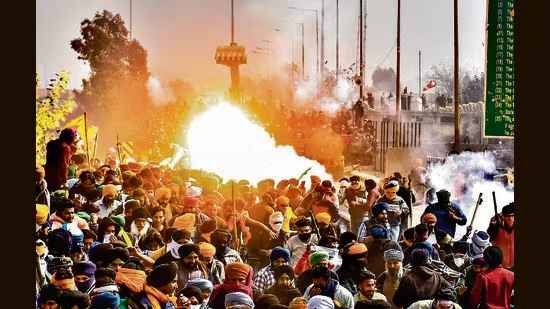A 21-year-old farmer died on Wednesday when protesters brought back their ‘Delhi Chalo’ march in response to the Centre’s proposals for a five-year minimum support price (MSP). In the fourth round of talks between the two parties, farmer leaders rejected the government’s proposal to break the deadlock. Farmers’ leaders and three Union ministers met on February 8, 12, 16, and 18, but the talks did not yield any results.
Subhkaran Singh, a farmer from Baloke village in Punjab’s Bathinda district, was killed and many others injured in a conflict between security troops and protesting farmers at Khanauri on the Punjab-Haryana border.
What Happened to the Deceased Farmer?
Doctors at Rajindra Hospital, where the deceased was taken away, indicated that a post-mortem study would be performed on Thursday to determine if it was a rubber bullet or a normal bullet.
According to police and agricultural leaders, at least 100 people were hurt during the violence on Wednesday. Haryana police further reported that 12 security officers were hurt as a result of stone-throwing and cold stubble being flung at them.
Sarwan Singh Pandher, the coordinator of the Kisan Mazdoor Morcha, stated that protest organizers will consider the next action and that all farmers will remain camped at the borders till then. He did, however, warn that the tragedy is likely to spark an escalation and spoil future negotiations between farmers and the government.
“We have decided to put our march to Delhi on hold till Friday (February 23) because a large number of farmers have been injured in police action and one farmer has been killed. There are issues of cremation, treatment compensation, etc. That’s why we have decided to stall the march to Delhi till Friday,” Pandher added.
What does CM Mann say?
Bhagwant Mann blamed the Haryana and central governments for the tense situation on the border and the death of 21-year-old farmer Shubhkaran Singh. To counter opposition party propaganda, the Punjab Chief Minister has declared that the FIR into Shubkaran Singh’s murder will be registered. He stated that an FIR would be filed following the postmortem of the killed teenager. The farmer associations had also protested and demanded swift action.
Bhagwant Mann has attended three of the four rounds of discussions between the Samyukt Kisan Morcha (Non-political) and three Union Ministers: Piyush Goyal, Arjun Munda, and Nityanand Rai. Following the fourth meeting, Bhagwant Mann appeared to be in favor of the central government’s offer of MSP on five pulse and cotton crops. He highlighted that the center’s approach will assist Punjab farmers in diversifying away from paddy and conserving subsurface water. The farmers had declined the center’s offer.
The main opposition parties, Congress and Shiromani Akali Dal (SAD), criticized the Chief Minister, accusing him of undermining discussions between farmers and the central government for political reasons. He was also held accountable for Haryana police attacks on protesting farmers at the Shambu and Khanauri borders. The murder of a young farmer, Shubhkaran Singh, fueled the crisis while also providing a chance to focus the attack on Bhagwant Mann.
Who is Shubhkaran Singh?
Subhkaran Singh, a farmer from Baloke village in Punjab’s Bathinda district, was murdered and many others injured in a conflict between security troops and protesting farmers at Khanauri on the Punjab-Haryana border. He is survived by his father, Charanjeet Singh, who works as a school van driver, two sisters, and a grandmother.
Shubhkaran was an animal husbandry specialist who possessed around 3 acres of land and some livestock.
Shubhkaran joined the farmers’ demonstration at the Khanauri border on February 13, the day they began their agitation to urge their ten demands.
The death of Subhkaran Singh has put a long shadow over the farmers’ struggle. It serves as a harsh reminder of the human toll of unsolved conflicts and the urgent need for peaceful resolutions. Addressing farmers’ concerns, recognizing their right to demonstrate, and conducting a thorough inquiry are critical steps towards mending wounds and moving forward constructively. The nation waits with anxious anticipation to learn how this tragedy will affect the farmers’ movement and the future of Indian agriculture.











Comments 1